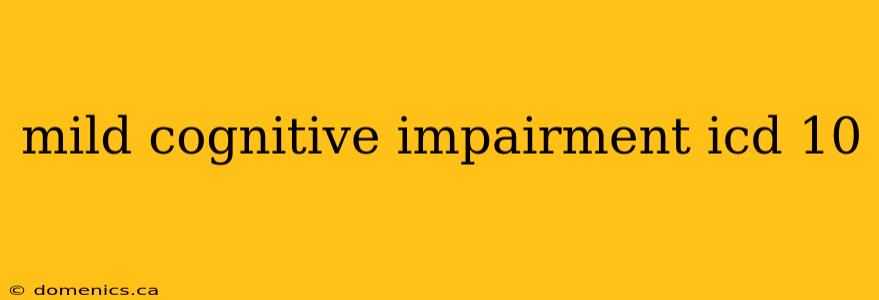Meta Description: Explore Mild Cognitive Impairment (MCI), its ICD-10 codes, symptoms, diagnosis, and treatment options. Learn how MCI differs from dementia and Alzheimer's, and the importance of early detection. This comprehensive guide provides valuable information for patients, families, and healthcare professionals. (158 characters)
Understanding Mild Cognitive Impairment (MCI)
Mild cognitive impairment (MCI) is a condition characterized by a decline in cognitive abilities, such as memory, thinking, and reasoning, that is greater than expected for a person's age and education level. However, this decline isn't severe enough to interfere with daily life activities. It's crucial to understand that MCI is not a diagnosis in itself, but rather a transitional stage. Some individuals with MCI will progress to dementia, while others remain stable or even experience improvement.
Key Differences Between MCI, Dementia, and Alzheimer's Disease
It's important to distinguish MCI from more severe conditions like dementia and Alzheimer's disease. While MCI represents a decline in cognitive function, it doesn't significantly impact daily functioning. Dementia, on the other hand, involves more substantial cognitive impairment that interferes with daily activities. Alzheimer's disease is a specific type of dementia, the most common cause.
- MCI: Noticeable cognitive decline, but daily living remains largely unaffected.
- Dementia: Significant cognitive decline impacting daily life.
- Alzheimer's Disease: A specific type of dementia characterized by progressive memory loss and cognitive decline.
ICD-10 Codes for Mild Cognitive Impairment
The International Classification of Diseases (ICD-10) is a widely used system for classifying diseases and health conditions. Unfortunately, there isn't a specific ICD-10 code solely dedicated to MCI. The coding depends on the specific symptoms and underlying causes. Diagnosis and coding require a comprehensive assessment by a healthcare professional. Possible relevant codes might include:
- F02: This category encompasses various forms of dementia, and depending on the presentation of MCI, a subtype under F02 might be applied. However, this is only used when the cognitive decline is severe enough to meet the criteria for dementia.
- R41: This code refers to cognitive disorders, not specifying a cause or severity. It could be used as a placeholder or for situations where a more specific diagnosis is still pending.
- Other codes: Additional codes may be necessary to describe associated conditions or comorbidities.
Symptoms of Mild Cognitive Impairment
Symptoms of MCI can vary greatly from person to person. Common signs include:
- Memory problems: Difficulty remembering recent events, appointments, or conversations.
- Language difficulties: Problems finding the right words, understanding complex language, or following conversations.
- Attention and concentration problems: Difficulty focusing, staying on task, or following instructions.
- Executive dysfunction: Challenges with planning, organization, problem-solving, and judgment.
- Visuospatial difficulties: Issues with spatial orientation, drawing, or visual perception.
Diagnosing Mild Cognitive Impairment
Diagnosis of MCI involves a thorough evaluation by a healthcare professional. This typically includes:
- Medical history: Review of the patient's medical and family history.
- Neurological examination: Assessment of neurological function, including reflexes and coordination.
- Cognitive testing: Standardized tests to assess memory, attention, language, and executive function (e.g., Mini-Mental State Examination (MMSE), Montreal Cognitive Assessment (MoCA)).
- Neuroimaging: Brain scans (MRI, CT) to rule out other neurological conditions.
- Blood tests: To check for underlying medical conditions that may be contributing to cognitive decline.
Treatment and Management of Mild Cognitive Impairment
There's no cure for MCI, but various interventions can help manage symptoms and potentially slow progression:
- Lifestyle modifications: Regular exercise, a healthy diet, cognitive stimulation, and stress management can help improve cognitive function.
- Medication: Certain medications might be used to treat underlying conditions or manage specific symptoms, such as depression or anxiety. However, there isn't a specific medication to treat MCI itself.
- Cognitive rehabilitation: Therapy to improve cognitive skills and strategies for coping with cognitive challenges.
- Support groups: Provide emotional support and practical advice for patients and their caregivers.
The Importance of Early Detection
Early detection of MCI is critical. While not everyone with MCI will develop dementia, early identification allows for timely interventions to manage symptoms, improve quality of life, and potentially slow progression. Regular cognitive screenings, especially for individuals at increased risk (family history of dementia), are recommended.
Conclusion
Mild cognitive impairment presents a complex challenge, requiring careful evaluation and personalized management strategies. While there isn't a single ICD-10 code for MCI, understanding the associated symptoms and diagnostic process is essential for effective care. Remember that early detection and appropriate interventions can significantly improve the quality of life for individuals affected by MCI and their families. If you or a loved one is experiencing symptoms of cognitive decline, it's crucial to seek professional medical evaluation.
